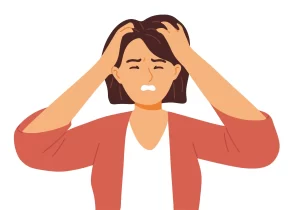 Stress headaches, also known as tension headaches, are a common type of headache that can be triggered by various forms of stress and tension. They can be debilitating and affect your daily life.
Stress headaches, also known as tension headaches, are a common type of headache that can be triggered by various forms of stress and tension. They can be debilitating and affect your daily life.
Today, we’ll explore what stress headaches are and provide strategies to alleviate and prevent them.
Understanding Stress Headaches
Causes
Stress headaches are typically caused by muscle tension and contraction in the head and neck region. Emotional stress, work-related pressure, or personal problems can trigger these muscle contractions.
Symptoms
The symptoms often include a dull, aching pain that can be felt on both sides of the head, a feeling of tightness around the temples or forehead, and tenderness in the neck and shoulder muscles.
Managing Stress
Stress Reduction Techniques
Learning to manage stress effectively is crucial. Engage in relaxation techniques such as deep breathing exercises, meditation, yoga, or progressive muscle relaxation to reduce overall stress levels.
Time Management
Organize your tasks and prioritize them to reduce the feeling of being overwhelmed. This can help prevent stress from accumulating.
Physical Activity
Regular exercise releases endorphins, which are natural stress relievers. Aim for at least 30 minutes of moderate exercise most days of the week.
Lifestyle Adjustments
Hydration and Nutrition
Dehydration and poor nutrition can exacerbate headaches. Drink enough water and maintain a balanced diet to keep your body functioning optimally.
Adequate Sleep
Ensure you get enough restorative sleep. Sleep deprivation can lead to increased stress and headaches.
Ergonomics
Evaluate your workspace and make ergonomic adjustments to reduce strain on your neck and shoulders, especially if you have a desk job.
Pain Relief Measures
Over-the-Counter Medications
Non-prescription pain relievers such as ibuprofen or acetaminophen can provide temporary relief from stress headaches. Consult a healthcare professional before long-term use.
Relaxation Techniques
Practice relaxation exercises when you feel a headache coming on. This can help reduce muscle tension and alleviate the pain.
Professional Help
Therapy
If stress is overwhelming, consider talking to a therapist or counselor who specializes in stress management and coping strategies.
Medication
In severe cases, a healthcare provider may prescribe medications to manage stress headaches. These can include muscle relaxants or preventive medications.
Stress headaches can significantly impact your quality of life, but they are manageable and preventable with the right strategies. By addressing the root causes of stress, adopting a healthy lifestyle, and seeking professional help when needed, you can take control of stress headaches and reduce their frequency and intensity.
Picture Credit: Freepik
